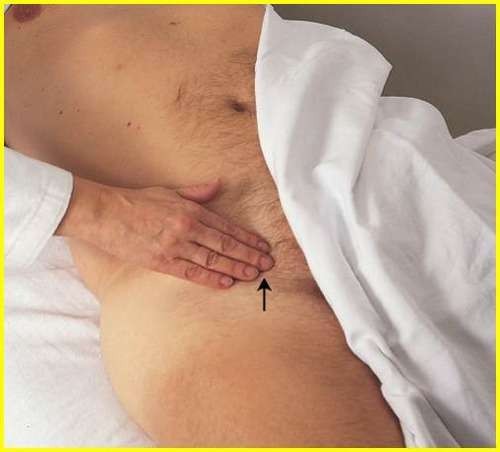A nurse is caring for an infant who has coarctation of the aorta.
Which of the following should the nurse identify as an expected finding?
Frequent nosebleeds.
Upper extremity hypotension.
Weak femoral pulses.
Increased intracranial pressure.
The Correct Answer is C

This is because coarctation of the aorta is a congenital condition where the aorta is narrow, usually in the area where the ductus arteriosus inserts. This causes a decrease in blood flow to the lower body, resulting in weak or absent pulses in the femoral arteries.
The other choices are incorrect for the following reasons:
Choice A is not a typical sign of coarctation of the aorta.
Nosebleeds can be caused by many factors, such as dry air, allergies, trauma, or bleeding disorders.
Choice B is also not a common finding in coarctation of the aorta. In fact, patients with this condition may have high blood pressure in the upper extremities due to the increased resistance of the narrowed aorta.
Choice D is not directly related to coarctation of the aorta.
Increased intracranial pressure can be caused by various conditions that affect the brain, such as head injury, stroke, infection, or tumor.
Normal ranges for blood pressure and pulse vary depending on age, sex, and health status. However, some general guidelines are:
- Blood pressure: less than 120/80 mmHg for adults; less than 95/65 mmHg for infants.
- Pulse: 60 to 100 beats per minute for adults; 100 to 160 beats per minute for infants.
Nursing Test Bank
Naxlex Comprehensive Predictor Exams
Related Questions
Correct Answer is D
Explanation
This is because shuffling gait is a common manifestation of pseudo-parkinsonism, which is a condition that mimics the symptoms of Parkinson’s disease due to the use of certain medications that block dopamine receptors, such as haloperidol. Pseudoparkinsonism can cause slowed movements, muscle stiffness, tremor, and postural instability.
Choice A. Nonreactive pupils are wrong because this is not a typical feature of pseudoparkinsonism or Parkinson’s disease.
Nonreactive pupils can be caused by other conditions, such as brain injury, drugs, or eye diseases.
Choice B. Serpentine limb movement is wrong because this is a characteristic of tardive dyskinesia, another drug-induced movement disorder that can result from the long-term use of dopamine receptor-blocking agents. Tardive dyskinesia causes involuntary movements of the face, tongue, and limbs that are often writhing or twisting.
Choice C. Smacking lips is wrong because this is also a sign of tardive dyskinesia, not pseudo-parkinsonism. Smacking lips is one of the orofacial movements that can occur in tardive dyskinesia due to abnormal muscle contractions.
Correct Answer is B
Explanation
A hematoma is a collection of blood outside a blood vessel that can cause swelling, pain, and bruising. It can indicate bleeding from the artery where the catheter was inserted, which can be a serious complication of cardiac catheterization.
The nurse should notify the provider immediately if a hematoma is observed.
Choice A is wrong because a heart rate of 90/min is within the normal range for adults and does not indicate a complication.
Choice C is wrong because bounding pulses in the affected extremity are expected after cardiac catheterization, as they indicate good blood flow to the area.
Choice D is wrong because the report of discomfort at the insertion site is common and usually mild after cardiac catheterization.
The nurse can provide pain relief as needed but does not need to notify the provider unless the pain is severe or persistent.
Normal ranges for heart rate are 60-100 beats per minute for adults. Normal ranges for blood pressure are 120/80 mmHg or lower for systolic pressure and 80 mmHg or lower for diastolic pressure. Normal ranges for oxygen saturation are 95-100% for adults.
Whether you are a student looking to ace your exams or a practicing nurse seeking to enhance your expertise , our nursing education contents will empower you with the confidence and competence to make a difference in the lives of patients and become a respected leader in the healthcare field.
Visit Naxlex, invest in your future and unlock endless possibilities with our unparalleled nursing education contents today
Report Wrong Answer on the Current Question
Do you disagree with the answer? If yes, what is your expected answer? Explain.
Kindly be descriptive with the issue you are facing.
